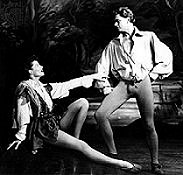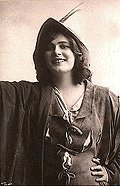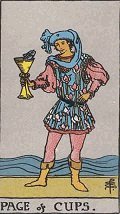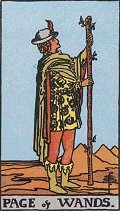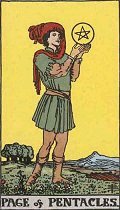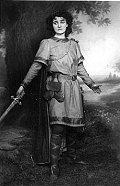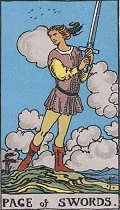|
Tarot Reflections |
August 1, 2004 |
| Shakespeare's Faux Pages Peter D. Cowen |
|||||||||||||||||||||||||||||||
|
As if by magic a tiny window opened in Elizabethan London between the years 1574 and 1642. It was then slammed shut by the Puritans, who had long awaited their chance to put the English theatres out of business. Of the many voices which were able to emerge and be heard during this brief flowering was that of William Shakespeare, a newcomer to London with a desire to perform upon and compose for the stage. One of the restrictions the Puritans had always been able to maintain was that no women were to be allowed to work as actresses. So, in the spirit of the show must go on, Elizabethan theatre companies wishing to keep their licensed patronage, employed young boys to perform the parts of female characters. Shakespeare made brilliant use of this boys as girls situation, by often having boys as girls disguised as girls as boys. Modern productions have seldom felt the need to keep the boys as girls, but have made delightful use of the possibilities Shakespeare created using girls as boys. The English theatre which Pamela Colman Smith knew intimately, under the guardianship of the greatest actress of her day, Ellen Terry, surely provided her with a wealth of background and experience when she set about to create her Tarot, and one place we see this most clearly is in her four strikingly inspirational Pages. I have made a brief outline sketch of each character and related my personal views as to the Tarot illustrations I think they most closely resemble in personality and individual spirit, hopefully kindling a renewed celebration of our honoured and joyous roots, since the struggles of medieval times to the glories of the English Renaissance, and despite many obstacles, right up to today.
Cards from the 1909 Rider Waite Tarot © U.S. Games. Photos from Peter Cowen's private collection. |
||||||||||||||||||||||||||||||
|
|
|||||||||||||||||||||||||||||||
|
Subscribe to Tarot Reflections, and receive notification of each update! |
|
Request to be added to the list by sending email to TarotReflections-subscribe@yahoogroups.com! |
All articles remain the
property of their respective authors.
Tarot Reflections is a publication of the American Tarot Association
- Copyright (C) 2004
Questions or Comments? Contact Us.


